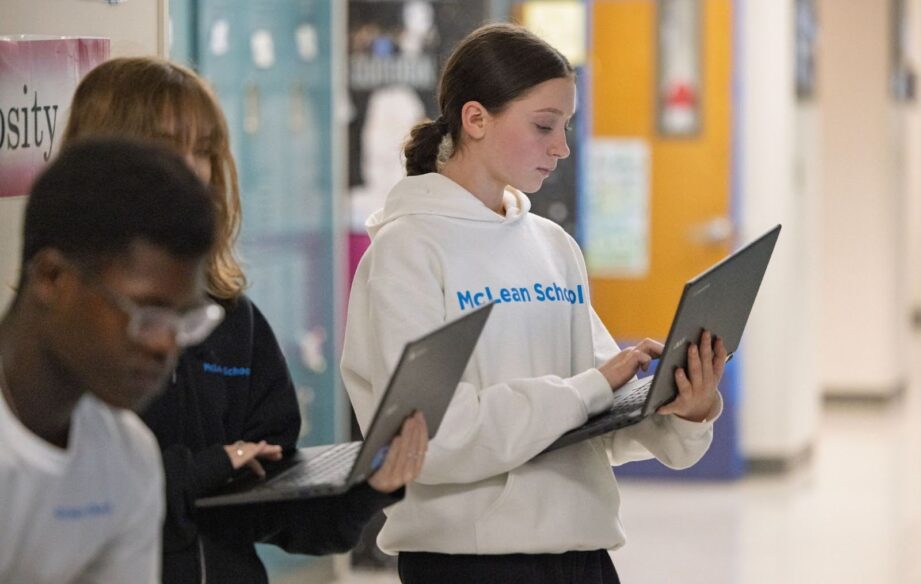Rachel Lugo, Grade 6
AI as Co-Teacher: How structure, scaffolds, and small shifts helped ADHD and dyslexic learners thrive.

This edited blog first appeared on futurise-edu.com
Teaching in a neurodiverse classroom, filled with students who have ADHD, dyslexia, and academic-based anxiety, has taught me that traditional models don’t fit every learner.
For years, I’ve been designing concept-based, inquiry-driven classrooms. For years, I’ve been designing classrooms centered on concept-based instruction and inquiry-based learning. When I first joined McLean School, I introduced this style of learning gradually. Inquiry and concept-based models were new for many of my students, so I was thoughtful about how much to bring in at a time.
Even with a careful start, I saw how my middle school students thrived when they were given space to explore big ideas and build knowledge together. By last year, with support to do more of what works, I leaned in further, and AI became a partner in making that approach sustainable.
The more I differentiate, the better their scores, but the more support I need to keep that level of personalization going. This year, AI helped me provide that support.
Deepening an Approach That Works
This was not a new experiment. It was a deepening of a pedagogy I’ve seen succeed across settings, but one that was new for this particular group of students.
During my first year, I also conducted a study on concept-based approaches for neurodivergent learners. I documented how powerful it is when we organize learning around big ideas rather than just content:
What shapes a civilization?
Who gets to have a voice?
How do systems help and harm?
That work confirmed what I’ve long believed: when students are trusted with inquiry and given the right scaffolds, they flourish.
This year, the difference was that I had the opportunity to build out these structures more fully, and AI helped me do it in a way that was manageable.
Where AI Came In
AI didn’t create this approach. It supported the scaling of it. I used AI as a co-planner, a sounding board, and a scaffold generator so that I could focus more of my time on students.
Planning for Differentiation
I used tools like MagicSchool, NotebookLM, and student-created “mini LLMs” to:
- Draft graphic organizers and scaffolds tailored for students with ADHD, dyslexia, and executive functioning challenges
- Generate leveled texts on the same topic so every student could work with the same concepts
- Suggest pacing strategies that respected different processing speeds and attention spans.
- These supports allowed me to meet every learner where they were, without drowning in prep time.
Roleplay and Performance Support
When students were preparing for Voting Day (a project requiring public speaking as part of our unit on ancient civilizations).
AI helped by:
- Suggesting sentence starters for hesitant speakers
- Creating “in character” question lists for improvisation practice
A Thinking Partner for Reflection
Having an AI partner gave me a safe space to:
- Test ideas
- Draft letters home explaining our projects
- Refine lesson outlines before sharing them
- It created more room for reflection and careful planning, which helped the whole class.
What Changed for Students
For many of my students, this was the first time a teacher acted as a facilitator instead of a director.
Engagement increased. Students who had been disengaged became creators of scripts, debates, and projects.
Confidence grew. Struggling readers found ways to express their ideas through oral, visual, and multimodal projects.
Thinking deepened. With scaffolds in place, they moved from “just finishing” to analyzing, connecting, and creating.
And yes, scores improved, even if that was never the main goal.
Why This Matters
When done well, AI isn’t a shortcut. It’s a way to free teachers to focus on the humans in front of them, recognizing first what students can do, not what they can’t.
Last year, AI:
- Helped me scale differentiation
- Made concept-based learning more manageable
- Created space for bright students, including those with dyslexia, ADHD, executive functioning challenges, and academic-based anxiety to be thinkers, not just test-takers
And that is the future of learning I want to be part of.
Interested in exploring McLean School in the DMV area? Request more information today.